| Srl | Item |
| 1 |
ID:
131466
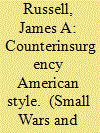

|
|
|
|
|
| Publication |
2014.
|
| Summary/Abstract |
This article examines the complex legacy of David Petraeus who was a key figure in the emergence of the US military shift towards counterinsurgency doctrine in the years after 2006. Although Petraeus has been perceived by critics as a publicity seeker, he can be credited with laying the foundations for a more serious commitment to COIN involving in particular in integrating conventional and Special Forces in arenas like village stability operations. The article looks a Petraeus's role in both Iraq and Afghanistan: it concludes that, in the case of Afghanistan, it is too early to assess whether counterinsurgency has had a decisive impact of the outcome of the war against the Taliban.
|
|
|
|
|
|
|
|
|
|
|
|
|
|
|
|
| 2 |
ID:
074235
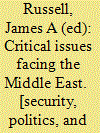

|
|
|
|
|
| Publication |
Macmillan, Palgrave Macmillan, 2006.
|
| Description |
224p.
|
| Standard Number |
140397246X
|
|
|
|
|
|
|
|
|
|
|
|
Copies: C:1/I:0,R:0,Q:0
Circulation
| Accession# | Call# | Current Location | Status | Policy | Location |
| 051766 | 355.033056/RUS 051766 | Main | Withdrawn | General | |
|
|
|
|
| 3 |
ID:
098962
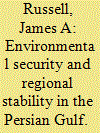

|
|
|
| 4 |
ID:
081914
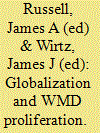

|
|
|
|
|
| Publication |
London, Routledge, 2008.
|
| Description |
xii, 170p.
|
| Series |
Routledge global security studies
|
| Standard Number |
9780415433945
|
|
|
|
|
|
|
|
|
|
|
|
Copies: C:1/I:0,R:0,Q:0
Circulation
| Accession# | Call# | Current Location | Status | Policy | Location |
| 053550 | 355.0217/RUS 053550 | Main | On Shelf | General | |
|
|
|
|
| 5 |
ID:
062491


|
|
|
| 6 |
ID:
098454
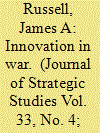

|
|
|
|
|
| Publication |
2010.
|
| Summary/Abstract |
This article analyzes operations by three battalions conducting counterinsurgency, or COIN, operations in Iraq over the period from July 2005 through March 2007: the 1st Battalion, 7th Marine Regiment (1-7) along the Iraq-Syrian border in the first half of 2006; the 1st Battalion, 37th Armored Regiment (1-37) battalion operating in south-central Ramadi in the fall of 2006; and the 2nd Battalion, 1st Infantry Regiment, or 2-1, operating in eastern Mosul in 2005-06. The empirical evidence presented in these cases suggest that, contrary to popular perceptions, the units successfully innovated in war - a process largely executed organically within the units themselves. Innovation is defined here as the development of new organizational capacities not initially present when the units deployed into the theater. The evidence presented in these cases suggests that the innovation process enabled these units to successfully transition from organizations structured and trained for conventional military operations to organizations that developed an array of new organizational capacities for full-spectrum combat operations. The units in this study developed these new capacitites largely on their own initiative.
|
|
|
|
|
|
|
|
|
|
|
|
|
|
|
|
| 7 |
ID:
123119
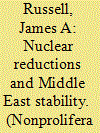

|
|
|
|
|
| Publication |
2013.
|
| Summary/Abstract |
The United States faces a series of strategic and policy conundrums as it attempts to promote strategic stability in the Persian Gulf and the wider Middle East. This article examines the relationship between a reduced US nuclear arsenal and strategic stability in the Persian Gulf and the Middle East. It argues that a series of interrelated political and military factors play a much more significant role in regional security and stability than the US strategic arsenal, which has never, with a few extraordinary exceptions, played a direct role in maintaining regional security. The United States has constructed a system of regional stability based on conventional deterrence and defense that has seen it forward base forces at various installations in the region in combination with efforts to arm, train, and equip host-nation militaries. Nuclear weapons have never played a prominent role in this regional system. Evidence presented in this article suggests that there is no compelling reason for the United States to abandon and/or modify the defensive system of conventional deterrence and defense by adding nuclear-backed guarantees to the mix.
|
|
|
|
|
|
|
|
|
|
|
|
|
|
|
|
| 8 |
ID:
058073
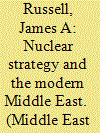

|
|
|
| 9 |
ID:
076724
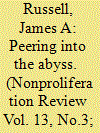

|
|
|
|
|
| Publication |
2006.
|
| Summary/Abstract |
The George W. Bush administration has successfully reoriented national policy and convinced the international community of the absolute necessity of denying weapons of mass destruction to terrorist groups. In addition to utilizing the tools of existing export control regimes, Washington promulgated the Proliferation Security Initiative and helped push through United Nations Security Council Resolution 1540 to expand the toolkit available to states to prevent the spread of dangerous technologies and weapons to terrorist groups. While these efforts are long overdue, they address only one aspect of the proliferation threat posed by non-state actors. Current efforts focus on the "demand" side of proliferation from terrorists but inexplicably leave unaddressed the role that a growing variety of non-state actors may play in shaping the supply side of an emerging 2016 proliferation market substructure. The proliferation supply network established by Pakistani scientist A. Q. Khan provides a precursor to a dangerous new proliferation environment dominated by transnational corporations, quasi-governmental entities, and individuals operating on the fringes of government control in weak or failing states that lack the will and the resources to implement effective export-control regimes. All states need to develop a more comprehensive and holistic view of the future role that a burgeoning plethora of non-state actors will play in nuclear proliferation by 2016.
|
|
|
|
|
|
|
|
|
|
|
|
|
|
|
|
| 10 |
ID:
068578
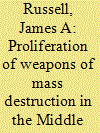

|
|
|
|
|
| Publication |
New York, Palgrave, 2006.
|
| Description |
xii, 242p.
|
| Series |
Initiatives in strategic studies: Issues and policies
|
| Standard Number |
1403970254
|
|
|
|
|
|
|
|
|
|
|
|
Copies: C:1/I:0,R:0,Q:0
Circulation
| Accession# | Call# | Current Location | Status | Policy | Location |
| 051082 | 327.17450956/RUS 051082 | Main | On Shelf | General | |
|
|
|
|
| 11 |
ID:
145568
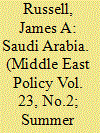

|
|
|
| 12 |
ID:
065452
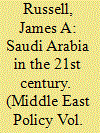

|
|
|
| 13 |
ID:
065205
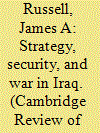

|
|
|
| 14 |
ID:
084941
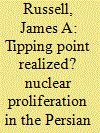

|
|
|
|
|
| Publication |
2008.
|
| Summary/Abstract |
The Persian Gulf and the wider Middle East are precariously perched on an uncertain nuclear threshold. Several regional states may be reconsidering their non-nuclear status. Iran's confrontation with the international community over its refusal to honour its obligations under the Nuclear Non-Proliferation Treaty is the overriding component states are viewing. Another element is Israel's nuclear program and its policy of preventing any regional state from threatening the Jewish state with nuclear weapons. Another complicating element in the strategic framework is a resurgent interest in nuclear energy.
What is the security policy community to make of these dynamics in which proliferation, deterrence, extended deterrence, and conflict escalation are all interacting in a complex interstate bargaining framework? This article applies a series of competing theoretical explanations for nuclear proliferation and assesses the implications they offer for policy prescriptions. Stressing neo-realist insights, it is shown here that control of proliferation requires recognition that the Middle East security dilemma has been altered - probably permanently - by the American invasion of Iraq, the increased political influence of Iran, and the continued violent spiral in the Arab-Israeli dispute. These three factors have combined to create new internal political pressures on regional regimes while at the same time creating a new and disturbing regional distribution of power that is shaping the region's approach to nuclear issues. Dealing with these factors is crucial in developing policies that can mitigate the further spread of nuclear weapons in the region.
|
|
|
|
|
|
|
|
|
|
|
|
|
|
|
|
| 15 |
ID:
058608
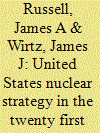

|
|
|
| 16 |
ID:
186370
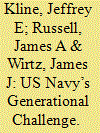

|
|
|
|
|
| Summary/Abstract |
Technological, social and environmental developments are producing changes at such a rate that they threaten to overwhelm the ability of individuals, societies and governments to adapt. The pace and impact of this technological churn is especially difficult for the US Navy because of the long time frames involved in traditional navy planning, acquisition and personnel cycles. The US Navy should prepare to ride succeeding waves of techno-strategic change – particularly the ‘robotics wave’ – and apply the rules of strategy in thinking about the role of technology in war at sea.
|
|
|
|
|
|
|
|
|
|
|
|
|
|
|
|